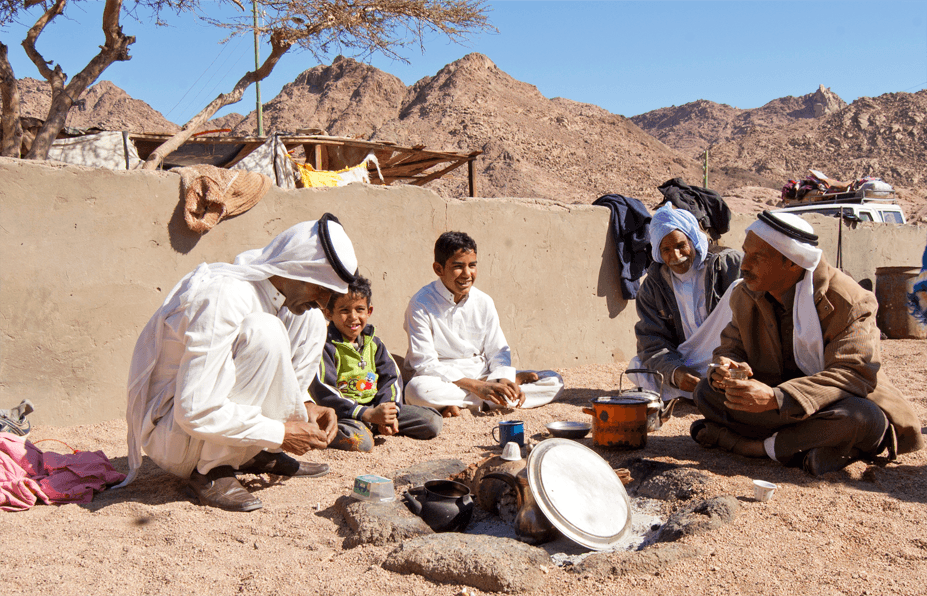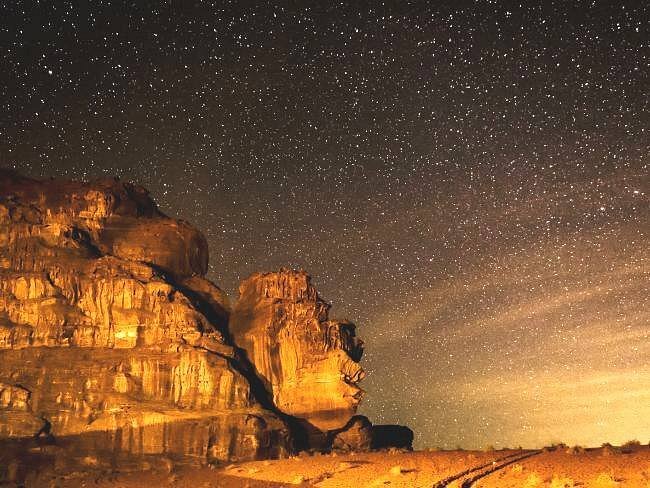A Day in the Life of a Bedouin in Wadi Rum

Experience the traditional lifestyle of the desert's indigenous people.
The Bedouin people have inhabited the deserts of Jordan for thousands of years, developing a unique way of life perfectly adapted to one of Earth's most challenging environments. While tourism has brought changes to traditional Bedouin life in Wadi Rum, many aspects of their culture, customs, and daily routines remain intact. This glimpse into a day in the life of a Bedouin in Wadi Rum offers insight into a fascinating culture that has stood the test of time.
Dawn: The Day Begins
For the Bedouin, the day typically begins before sunrise. In a desert environment, the early morning hours provide the coolest temperatures for essential tasks. The first order of business is often prayer—most Bedouin are devout Muslims who observe the five daily prayers, with the first (Fajr) occurring at dawn.
After prayer, it's time to rekindle the fire for morning tea. Tea is far more than just a beverage in Bedouin culture—it's a cornerstone of hospitality and daily life. The preparation follows a specific ritual, with tea typically boiled three times with generous amounts of sugar and often flavored with sage, mint, or other desert herbs.
Morning: Tending to Essential Needs
Traditionally, morning hours would be dedicated to tending livestock—primarily goats and camels. While fewer Bedouin maintain large herds today, those who do take their animals to graze in areas where desert plants grow. Camels can be left to roam relatively freely, as they know to return to their owners, but goats require more supervision.
For Bedouin involved in tourism, mornings might instead be spent preparing for the day's visitors—checking jeeps, organizing supplies for tours, or preparing accommodations for new guests arriving at camps.
Women typically focus on domestic tasks in the morning, including bread making. Traditional Bedouin bread (arbood) is baked in the embers of a fire, creating a simple but delicious flatbread that forms a staple of the diet. Water collection and conservation are also critical morning tasks, with every drop carefully managed.
Midday: Seeking Shelter
As the sun climbs higher and temperatures rise, activity slows down. The harsh midday heat makes this a time for seeking shade and resting. Traditionally, this would be inside a goat-hair tent, which is remarkably effective at providing cool shade. The tight weave of the fabric blocks the sun while allowing air to circulate.
This period might be used for socializing, storytelling, or handicrafts. Many Bedouin women are skilled at weaving and embroidery, creating intricate designs that tell stories of their tribal heritage. Men might use this time for making or repairing tools and equipment.
For those working with tourists, midday might involve serving lunch to visitors or guiding them to shaded areas for their own rest period. A simple lunch typically consists of bread, yogurt, olive oil, and za'atar (a Middle Eastern herb mix).
Afternoon: Work Resumes
As temperatures begin to cool in the late afternoon, activity picks up again. This is often when Bedouin guides take tourists on jeep tours or camel rides to see the sunset from prime locations. The changing light creates spectacular effects on the red sandstone formations, and guides know exactly where to position visitors for the best experience.
For those maintaining more traditional lifestyles, the afternoon is when livestock are gathered and brought back to camp. It's also a time for collecting firewood for the evening's cooking and warmth, as desert nights can be surprisingly cold.
Evening: Community Time
The evening meal is typically the main meal of the day and often a communal affair. Traditional Bedouin hospitality dictates that guests are always welcomed and fed, even if resources are limited. A special occasion might call for mansaf (Jordan's national dish of lamb cooked in fermented dried yogurt and served with rice) or zarb (meat and vegetables cooked in an underground sand oven).
After dinner, the community gathers around the fire. This is a time for coffee ceremonies, music, and storytelling. Bedouin coffee (gahwa) is prepared in a distinctive long-beaked pot and served in small cups, often flavored with cardamom. The coffee ceremony has its own etiquette and is an important social ritual.
Music is another essential element of evening gatherings. Traditional instruments like the rababa (a single-stringed violin) and the shabbaba (a type of flute) accompany songs that tell stories of tribal history, love, and desert life. Poetry has always been highly valued in Bedouin culture, with skilled poets earning great respect.
Night: Under the Stars
As the fire dies down, it's time for the final prayer of the day and then sleep. Traditionally, Bedouin might sleep inside their tents or outside under the stars, depending on the weather. Their intimate knowledge of the night sky served not just for navigation but as a calendar marking seasonal changes that would affect migration patterns.
Today, those running tourist camps might stay up later, ensuring guests are comfortable and perhaps offering stargazing sessions with explanations of how the stars guided Bedouin life for centuries.
The Changing Bedouin Way of Life
While this description captures elements of traditional Bedouin daily life, it's important to note that Bedouin culture in Wadi Rum has evolved significantly in recent decades. Many Bedouin now live in permanent settlements rather than moving seasonally with their herds. Tourism has become a major source of income, with many working as guides, camp operators, or drivers.
Modern technology has also made inroads—it's not uncommon to see solar panels outside traditional tents, powering mobile phones that keep Bedouin connected to family members and the outside world. Many younger Bedouin are educated in schools and some pursue higher education in cities.
Despite these changes, core values of Bedouin culture remain strong: hospitality, honor, community solidarity, and a deep connection to the desert landscape. The Bedouin of Wadi Rum have managed to adapt to changing circumstances while preserving the essence of their cultural identity.
For visitors to Wadi Rum, spending time with Bedouin hosts offers more than just a glimpse into an exotic lifestyle—it's an opportunity to learn from a culture that has mastered the art of living sustainably in one of Earth's most challenging environments, finding abundance and joy in a landscape that might seem barren to outsiders.

